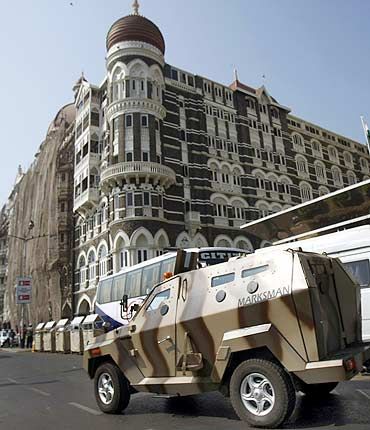Improved coordination between various security agencies and a quick response mechanism are the key to Mumbai's security in the nine years following the 26/11 attacks.
Dnyanesh Chavan/PTI reports.

The Maharashtra Anti-Terrorism Squad has deradicalised 86 people in the last two years as a part of its efforts to wean away misguided youth from the path of extremism in the aftermath of the 26/11 Mumbai terror attacks.
Those brought into the mainstream include a young couple, both post-graduates in pharmacy, an aeronautical engineer and an IT professional.
The deradicalisation is done to bring back to normal life individuals who had strayed in the name of 'jihad', a senior ATS officer said.
All these people, including eight women, had come in contact with their handlers via social networking sites and were radicalised online.
They were on the verge of joining ISIS or planning to work for the terror organisation, but the law enforcement agencies silently monitored their activities and successfully brought them back to normal life, the ATS officer said.
The ATS approached their families and their community's spiritual leaders as part of this process. Counsellors were also roped in.
After continuous efforts for more than two months in each case, all these individuals were deradicalised. They have been brought back into the mainstream, the ATS officer said.
Among the many initiatives of tackling terrorism after the 26/11 attacks, one of the ATS' important programmes was to keep a close watch on the online activities of young minds of the minority community, he said.
A young couple, who completed their post-graduation in pharmacy, were radicalised online following which they left the country to join ISIS. Law enforcement agencies, which kept a watch on them, brought them back successfully, the ATS officer said.
"We have deradicalised these people and are also helping them lead a normal life. But we also monitor their activities constantly because there could be some attempts from the other side to trap them again," the ATS officer added.
In 2011, four men from Kalyan township in Thane district left the country and traveled to Iraq to join ISIS.
Alarmed by this startling development, the law enforcement agencies became vigilant about online activities.
In December 2015, the ATS identified a Pune-based young woman who was indoctrinated by an ISIS sympathiser.
During an ATS investigation the officers discovered she had decided to leave the country and join ISIS.
In an attempt to win back radicalised individuals, the ATS, with the government's help, has taken some important steps. These include offering training for suitable jobs and small bank loans to start a business so that they can live with honour and dignity, the ATS officer said.
"It is our duty to bring them on the right track by counselling and other efforts of deradicalisation," Maharashtra's ATS chief Atulchandra Kulkarni told PTI.
Apart from this, the ATS maintains a strict vigil to avert any kind of terror-related incidents mounted by sleeper cells. "We are providing our officers training to update their knowledge to tackle terrorism," Kulkarni said.
"We are translating some important books about terrorism, like of al-Qaeda, ISIS, into Marathi so that our men get an idea of the latest trends (of how to tackle terrorism )," he said.
In the next couple of months, the ATS is expected to get equipment worth Rs 15 crore (Rs 150 million). "These will help build our capacity," the ATS chief added.
Mumbai police upgrade response mechanism post 26/11
Improved coordination between various agencies and a quick response mechanism put in place by the police are the key to Mumbai's security in the nine years following the 26/11 attacks.
The police force is capable of securing the city as its response mechanism has improved over the years, Mumbai Police Commissioner Datta Padasalgikar said.
Following the terror attacks between November 26 and 29, 2008, the Maharashtra government took a range of measures to upgrade the police force in areas like technology, training, gadgets, weapons and coordination between all the security agencies, another police officer said.
To beef up coastal security, the government provided radio frequency identity cards and smart cards to fishermen, he said.
The defence ministry has installed multiple radar facilities to spot suspicious movement on the entire west coast, the officer said.
Setting up a marine police wing and securing the coastline with the help of surveillance drones are among the government's ambitious projects, another officer said.
The sharing of intelligence among security agencies -- including the police, navy, coast guard and other central agencies -- has also improved, he said.
The Maharashtra police recently procured 4,600 bullet-proof jackets, another police officer said. The procurement was delayed as no company was willing to bid for it following allegations of purchase of substandard bullet-proof jackets, he added.
Of the 4,600 jackets, the testing of 3,000 jackets has been done and these will be distributed in a few days to various police units, the officer said.
"Apart from the jackets, we also purchased 1,500 bullet-proof helmets which we have distributed," he said.
In the last year, the police also procured bullet-proof shields, 'morchas' (a kind of protective gear), night vision monoculars and other modern weaponry for the quick response teams, he said.
There are proposals to procure bomb suits and total containment vehicles, the officer added.
Another police officer said the Maharashtra police's 'Force One' commando team has obtained permission to carry weapons on flights. Earlier, only National Security Guard commandos were allowed to carry weapons on flights.
"We have quick response teams in every region comprising young and fit men who can strike in case of any eventuality," Police Commissioner Padasalgikar told PTI.
The police regularly conducts joint exercises featuring Force One and NSG commandos. The NSG set up a base in Mumbai after the 2008 attacks which claimed 166 lives -- including 18 police officers and two NSG commandos -- and wounding hundreds of others.
IMAGE: A Mumbai police commando vehicle near the Taj Mahal hotel, November 2010. Photograph: Punit Paranjpe/Reuters










